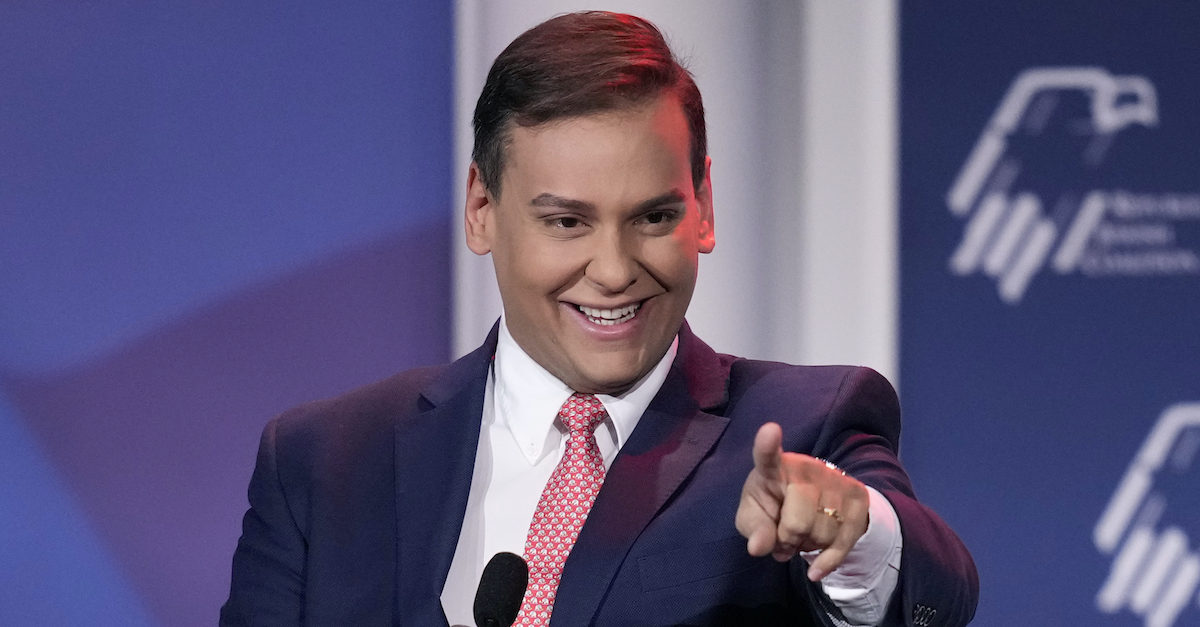
Rep.-elect George Santos, R-New York, speaks at an annual leadership meeting of the Republican Jewish Coalition Saturday, Nov. 19, 2022, in Las Vegas. The group has since issued a statement saying that Santos “will not be welcome” at any future RJC events. (AP Photo/John Locher, File)
Under scrutiny by U.S. and Brazilian prosecutors, Rep.-elect George Santos of New York is expected to take the oath of office today under the watchful eyes of no fewer than four jurisdictions.
One of the non-prosecutorial bodies looking into the Republican may start its tenure hobbled.
Sparking alarm from advocacy groups, the House GOP intends to vote on a provision slipped into the rules of the 118th Congress that would effectively change the composition and resources of the House Ethics Committee. A bipartisan watchdog, the Committee historically has had a 5-5 breakdown between the two major parties.
The rules proposed by the new Congress, which will be under Republican control, do not alter that fundamental structure. Two of the changes, however, could effectively oust the current Democratic members and make it harder to hire staff necessary to conduct investigations.
As envisioned by the bill, “the provision regarding appointment and compensation of staff shall require an affirmative vote of at least 4 members of the board not later than 30 calendar days after the date of the adoption of this resolution.”
Legal expert Mitchell Epner, a former federal prosecutor, notes that will give the committee an exceedingly narrow, monthlong window to replace board members and hire new staff, “including background checks.”
“I cannot imagine a reason to do this for the Ethics Committee (and no other committee), other than to decrease its efficacy,” added Epner, who is a partner at the firm Rottenberg Lipman Rich PC.
One advocacy group, Accountable.US, already filed an ethics complaint against Santos after the congressman-elect’s apparent fabrications about his education, work experience, religion, family history and more came to light in a New York Times exposé. The group also raised questions about how he came to loan his campaign more than $700,000, just two years after reporting no assets and a modest $55,000 a year income.
Prosecutors are said to be questioning the campaign finance money trail. Following reports that Santos may have misrepresented his Jewish heritage, the Republican Jewish Coalition issued a statement barring Santos from future events.
For Accountable.US, the timing of the proposed rules change for the Ethics Committee appeared to be suspect.
“It’s telling that one of the very first actions of the incoming MAGA Republican-led House will be to kneecap a bipartisan office that oversees Congressional ethics,” the advocacy group’s president Kyle Herrig wrote in a statement. “This is about protecting their ethically-challenged Members like fraudster George Santos or Jan 6 subpoena-defying Jim Jordan from accountability – or perhaps in anticipation of a new wave of corruption allegations and ethics violations from other MAGA extremists.”
The Ethics Committee can recommend actions such as censure or expulsion, though it cannot execute them. Given its split-even composition, only one GOP member would have to break ranks on such a recommendation if the Democrats are united in such an action.
“There is certainly no good reason to make it easier for members to get away with ethics violations, which only invites bad behavior,” Herrig said. “It sends a clear message that the MAGA House is more interested in sweeping any corruption amongst their ranks under the rug and performing political stunts against the Biden administration than they are doing anything constructive on behalf of the American people.”
On Monday night, the Times reported that Santos’s woes have expanded internationally. Brazilian law enforcement authorities announced their intention to revive a 2008 fraud case involving a stolen checkbook, which had gone dormant because of the country’s failure to locate him, according to the paper.
Epner believes that even if the proposed rules changes pass, the Committee will be able to handle an investigation into the snowballing scandals surrounding Santos.
“Even diminished, I would expect the George Santos case to be a slam dunk,” he said. “The bigger issue are the referrals from the Jan. 6 Committee.”
In addition to referring criminal charges against former President Donald Trump and his lawyer John Eastman, the Jan. 6 Committee also asked the Ethics Committee to consider referrals of top Republican lawmakers like House Minority Leader Kevin McCarthy of California and Representatives Jim Jordan of Ohio, Scott Perry of Pennsylvania, and Andy Biggs of Arizona.
McCarthy, in particular, is reportedly struggling to hang on to his position as the House GOP’s leader in time to become Speaker of the House.